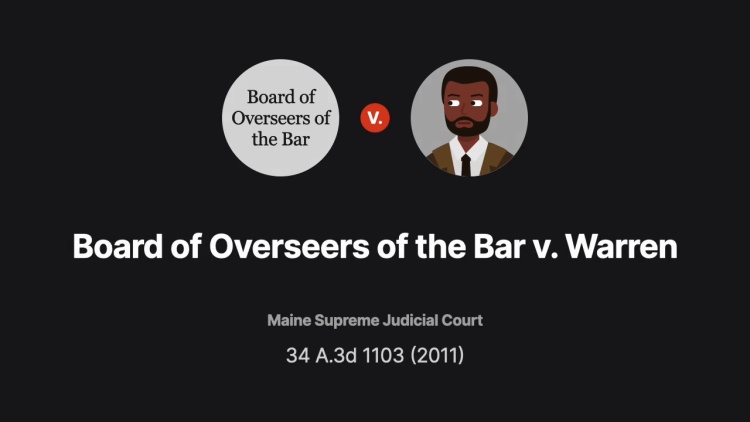Board of Overseers of the Bar v. Warren
Maine Supreme Judicial Court
34 A.3d 1103 (2011)

- Written by Sean Carroll, JD
Facts
John Duncan was a partner at Verrill Dana LLP. After a paralegal noted a discrepancy in the account of one of Duncan’s clients, David Warren (defendant), the firm’s managing partner, discovered that Duncan was mishandling and embezzling client funds. Warren confronted Duncan, and Duncan agreed to pay back the money and offered to resign. Warren also informed the other five members of the firm’s executive committee (defendants) at an executive committee meeting. The committee decided to decline Duncan’s offer to resign. The committee did not discuss or contemplate reporting Duncan’s conduct to the Board of Overseers of the Bar (plaintiff) or to the firm’s in-house general counsel. The committee did decide to report the conduct to Kurt Klebe, the director of Duncan’s practice group. Warren, however, delayed disclosure to Klebe for approximately three months due to Duncan’s fragile mental state at the time. After disclosure, Klebe discovered additional client funds that Duncan had defrauded. The firm fired Duncan and at that point notified the board. The board brought suit against the six members of the firm’s executive committee, alleging a violation of Maine Bar Rule 3.13(a) (which is equivalent to Model Rule of Professional Conduct 5.1). A single justice of the Maine Supreme Judicial Court determined that the attorneys did not violate Maine Bar Rules. The board appealed.
Rule of Law
Issue
Holding and Reasoning (Gorman, J.)
What to do next…
Here's why 907,000 law students have relied on our case briefs:
- Written by law professors and practitioners, not other law students. 47,100 briefs, keyed to 996 casebooks. Top-notch customer support.
- The right amount of information, includes the facts, issues, rule of law, holding and reasoning, and any concurrences and dissents.
- Access in your classes, works on your mobile and tablet. Massive library of related video lessons and high quality multiple-choice questions.
- Easy to use, uniform format for every case brief. Written in plain English, not in legalese. Our briefs summarize and simplify; they don’t just repeat the court’s language.





